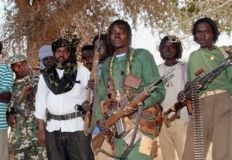Darfur rebels hope conference leads to unity, then peace
Feb 26, 2007 (WADI ANKA, Sudan) — Amid the vast sands of a dry Darfur riverbed, more than 100 rebel commanders and tribal chiefs are hoping for a turning point in Darfur’s humanitarian disaster: A unity deal among rival rebel factions as a step toward new peace talks with the government.
 Sudan’s government has done everything it can to discourage the milestone unity conference from taking place: It has bombed previous gatherings of rebel leaders and made overtures to individual rebel commanders to try to lure them from the meeting.
Sudan’s government has done everything it can to discourage the milestone unity conference from taking place: It has bombed previous gatherings of rebel leaders and made overtures to individual rebel commanders to try to lure them from the meeting.
But the rebels gathering here from various factions of the Sudan Liberation Army claim nothing will dissuade them this time.
Camping in a secret location near a place called Wadi Anka as they wait for the formal conference to begin later this week, rebel leaders say they are determined to unite their rival political and military leaders, as a first step toward proposing new peace talks with the government.
“We’ve tried before, but this is the first time we’re really serious about it,” said Saleh Adam Itzahk, a senior rebel commander from the northeastern Jebbel Midob mountains of Darfur, the vast arid region of western Sudan.
“The war is dragging on because of our disunion,” he said. “And we’ve been cheated of our rights too many times because of it.”
The conference comes at a time when the situation in Darfur — widely viewed as the world’s worst humanitarian crisis — is only getting worse. More than 200,000 people have died in Darfur since 2003, when ethnic African rebels took up arms against the Arab-led central government, accusing it of neglect.
Another 2.5 million people are now refugees, with many inside Darfur and others spilling across borders into Chad and Central African Republic, says the U.N. It accuses Sudan’s pro-government forces of atrocities against Darfur civilians.
The SLA conference’s main goal is to avoid a repeat of the Darfur peace agreement signed last May in Abuja, Nigeria, by the Sudanese government and one rebel leader — under intense international pressure.
The rebels’ longtime overall leader, Abdelwahid al-Nur, refused that deal. Although many in the SLA now contest his leadership, most Darfur rebels and civilians also rejected the accord. They contend it provided too little compensation for refugees and offered no real guarantee the Sudanese government would rein in fierce janjaweed miitias if the rebels disarmed.
In part because of that, chaos and violence have only worsened across Darfur in recent months, with new government and janjaweed attacks on rebels, and aid groups increasingly unable to help refugees.
Jar al-Naby, the SLA spokesman and a rebel field commander, said rebels have no trust left in the African Union, which brokered the Abuja accord. About 7,000 overwhelmed AU peacekeepers in Darfur have been unable to enforce the agreement, and Sudan’s government in Khartoum rejects a Security Council resolution to replace them with 22,000 U.N. peacekeepers.
“We want the United Nations to act as mediator and its troops to come here,” al-Naby said.
The one rebel chief who signed the previous peace deal, Minni Minawi, is scorned here. “The international community must finally recognize that we represent the vast majority of Darfur,” said al-Naby. “Look around you.”
Around him, an Associated Press reporter who traveled to Wadi Anka recently saw 100 rebel commanders in camouflage combat gear and tribal chiefs in floating white cotton gowns and turbans. Along with clusters of armed bodyguards, they gathered in small groups across the vast sandy stretch here, sipping cups of mint tea under the shade of scattered trees.
As they wait for other rebel commanders to reach the secret meeting place, dozens of pickup trucks jammed with rebels patrol the area. Sudan’s government bombed a previous, tentative SLA conference in December, drawing angry denunciations from the AU force chief who called it wrong for Khartoum to hinder rebel unity efforts.
Many of the field commanders here claim they left hundreds of fighters back home, although none of their numbers could be independently verified.
One rebel commander, Mohammed Ibrahim, was nervously shouting orders into a satellite phone on a recent day last week. A janjaweed militia had entered his sector of the remote western Jebbel Moon mountains that morning, he said, and he was organizing a counterattack by phone.
The U.N. says a previous janjaweed militia raid in Jebbel Moon killed 53 civilians, including 27 children, last December, and Ibrahim was anxious to prevent another calamity.
Outside observers claim Sudan’s government has armed and organized the janjaweed to beef up its regular army. But Sudan’s government may be losing its grip on the militia because of new infighting among its members: Several hundred nomads have died in intertribal fighting this year, the U.N. says.
SLA leaders say that reinforces their conviction that Sudan’s government has no choice but to renegotiate a peace deal. They warn of a massive campaign against towns and other government positions if the government rejects their eventual unity overture.
“Time is on our side,” al-Naby said.
(AP)
